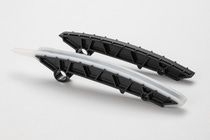Media
Turning scrap into new –
BASF presents two new recycling processes for polyamides from end-of-life vehicle
- Two new BASF recycling processes for polyamide 6 from end-of-life vehicles: depolymerization and solvent-based recycling.
- Pilot projects with ZF and Pöppelmann demonstrate near-series applications using components for Mercedes-Benz.
- Contribution to the circular economy: High-quality recyclates instead of incineration - dismantled parts and complex waste streams such as automotive shredder residue (ASR) are turned back into high-quality plastics.
Ludwigshafen, Germany, 02 October 2025. At this year's K 2025, BASF and its cooperation partners will be presenting two pioneering technologies that enable the recycling of polyamides from end-of-life vehicles. While the recovery of metals from decommissioned vehicles has been successfully practiced for decades, around 200 kilograms of plastic per vehicle often end up being incinerated. BASF's new technologies aim to change this, particularly in view of the upcoming regulatory requirements of the End-of-Life Vehicle Regulation (ELVR). Pilot projects demonstrate how automotive waste can be used as a material and fed back into a closed cycle for the automotive industry.
Depolymerization of dismantled end-of-life polyamide components
BASF has developed an innovative chemical recycling process that sets new standards in the recycling of technical plastics and demonstrated the capabilities in a pilot project. This process makes it possible to recycle even heavily used and contaminated plastic parts - in this case also ZF Group used oil pans from end-of-life vehicles - efficiently and sustainably at the end of their life cycle. At the core of the process is depolymerization, where the long polyamide chains are broken down at their inherent cleavage points into their original building blocks - the monomers. In the subsequent step, the monomer caprolactam obtained from the depolymerization of PA6 is purified. This allows potentially disruptive impurities from the material's history of use to be completely removed. These impurities would have remained in the material during mechanical recycling and would have potentially impaired the quality and safety of the recycled material. The material is then re-polymerized into high-quality polyamide, which is further processed into a polyamide compound in accordance with the requirements of the application. This meets the highest quality standards and is suitable for demanding components in the automotive industry – closing the loop automotive-to-automotive.
"What used to be considered non-recyclable is now the starting point for high-quality new products," explains Martin Scheuble, Team Leader Circularity Engineering Plastics at BASF.
The successful processing of the recycled material by the project partner ZF Group into a complex, technically sophisticated chassis component - the so-called Stabilizer Link - for Mercedes-Benz is a notable proof of its suitability for practical use. Tests carried out on test specimens and the manufactured components themselves show that depolymerization enables polyamide compounds that can be used without compromising on performance or other chemical and physical properties.
"This project highlights the potential of recycled plastic - even for technically demanding applications - and underlines ZF's innovative strength in establishing sustainable material cycles," says Dr. Michael Lohrmann, Director Materials Technology at ZF, explaining the relevance for the automotive supplier.
Solvent-based polyamide recycling from automotive shredder residue
The second pilot project is dedicated to the recycling of automotive shredder residue (ASR) - a complex mix of different materials that remain after the removal of mainly metals and glass. Thanks to close cooperation with a recycling company, it has now been possible to extract the polyamides from this mixture in a largely pure form using newly available sorting and processing technology.
The polyamide fraction obtained in this way was used as the starting material for a new solvent-based recycling process as part of the pilot project. In this process, the polymer chain is not split but selectively dissolved with the aid of a suitable solvent, then purified and finally reprocessed into PA6 compounds.
This technology was validated using a chain guide rail in series production at Mercedes-Benz. The components were manufactured and successfully tested under near-series conditions by the project partner Pöppelmann as part of the pilot project.
"The project impressively demonstrates that solvent-based recycling is a practical alternative for plastics that are difficult to recycle mechanically. It makes an important contribution to the holistic circular economy - from the car back into the car," emphasizes Steffen Meyer, Team Leader Production Technology at Pöppelmann.
Life cycle analysis (LCA) confirms significant CO2 savings
Accompanying the pilot projects, life cycle analyses (LCA) were carried out by an external partner. The results clearly illustrate the advantages of the new recycling processes: Both the solvent-based technology and recycling via depolymerization demonstrate substantial CO₂ emission savings - compared not only to the production of conventional polyamide compounds based on fossil raw materials, but also to traditional plastic recycling methods such as thermal recovery. Each process can therefore make an important contribution to the circular economy and the sustainable transformation of the plastics industry in the future.
Keeping the technology spectrum broad
BASF summarizes the three phases of the product life cycle "make, use, recycle" under #OurPlasticsJourney. BASF offers a wide range of recycling solutions for the last stage of the cycle, as recycling targets can only be achieved if they are used in a complementary manner. Above all, the type and availability of waste and the degree of sorting determine which technologies are most suitable.
Jana Krägenbring-Noor, Head of Sustainability & Environmental Protection at Mercedes-Benz, explains: “Mercedes-Benz is committed to the use of secondary raw materials in its vehicles today and in the future as part of resource conservation and circularity. To continuously increase the availability of such sought-after secondary materials, the expansion of existing and new recycling technologies is essential. Pilot projects along the value chain are of central importance to continuously expand the range of recycling processes used and to gain well-founded insights. This technological diversity is another important step in making our contribution to resource conservation."
"We are continuously improving the efficiency of physical methods such as mechanical and solvent-based recycling. In addition, we are convinced that complementary technologies such as chemical recycling, which includes depolymerization, pyrolysis and gasification, are necessary to further promote the circular economy and reduce the plastic waste that still ends up in landfills or is incinerated today, as well as the potential to obtain high-quality recycled plastics. The right regulatory framework is essential to make the best use of the various waste recycling options and to develop all technologies in parallel," explains Dr. Martin Jung, President of BASF Performance Materials.
More at K2025
As part of the #OurPlasticsDialogues on the BASF stage, the cooperation partners will present both pilot projects:
October 14, 2025 at 3 p.m.
BASF, Hall 5, Stand C21/D21
About BASF
At BASF, we create chemistry for a sustainable future. Our ambition: We want to be the preferred chemical company to enable our customers’ green transformation. We combine economic success with environmental protection and social responsibility. Around 112,000 employees in the BASF Group contribute to the success of our customers in nearly all sectors and almost every country in the world. Our portfolio comprises, as core businesses, the segments Chemicals, Materials, Industrial Solutions, and Nutrition & Care; our standalone businesses are bundled in the segments Surface Technologies and Agricultural Solutions. BASF generated sales of €65.3 billion in 2024. BASF shares are traded on the stock exchange in Frankfurt (BAS) and as American Depositary Receipts (BASFY) in the United States. Further information at www.basf.com.
BASF at K 2025: Welcome to #OurPlasticsJourney!
#OurPlasticsJourney continues in 2025 at K! Join us at our booth in Hall 5, C21/D21 and discover how to start your green transformation. At BASF, we look at the entire lifecycle of plastics with Make, Use and Recycle. Come and explore sustainability and innovation in high-performance plastics at K 2025. K is the #1 trade fair for plastics and rubber and will take place in Düsseldorf, Germany, from October 8 – 15, 2025. Visit plastics.basf.com/K2025.
About Mercedes-Benz AG
Mercedes-Benz AG is part of the Mercedes-Benz Group AG with a total of around 175,000 employees worldwide and is responsible for the global business of Mercedes-Benz Cars and Mercedes-Benz Vans. Ola Källenius is Chairman of the Board of Management of Mercedes-Benz AG. The company focuses on the development, production and sales of passenger cars, vans and vehicle-related services. Furthermore, the company aspires to be the leader in the fields of electric mobility and vehicle software. The product portfolio comprises the Mercedes-Benz brand with Mercedes-AMG, Mercedes-Maybach and GClass with their all-electric models as well as products of the smart brand. Mercedes-Benz AG is one of the world's largest manufacturers of high-end passenger cars. In 2024 it sold around 2,4 million passenger cars and vans. In its two business segments, Mercedes-Benz AG is continually expanding its worldwide production network with more than 30 production sites on four continents, while gearing itself to meet the requirements of electric mobility. At the same time, the company is constructing and extending its global battery production network on three continents. As sustainability is the guiding principle of the Mercedes-Benz strategy and for the company itself, this means creating lasting value for all stakeholders: for customers, employees, investors, business partners and society as a whole. The basis for this is the sustainable business strategy of the Mercedes-Benz Group. www.mercedes-benz.com
About ZF
ZF is a global technology company supplying advanced mobility products and systems for passenger cars, commercial vehicles and industrial technology. Its comprehensive product range is primarily aimed at vehicle manufacturers, mobility providers and start-up companies in the fields of transportation and mobility. ZF electrifies a wide range of vehicle types. With its products, the company contributes to reducing emissions, protecting the climate as well as enhancing safe mobility. Alongside the automotive sector – passenger cars and commercial vehicles – ZF also serves market segments such as construction and agricultural machinery, wind power, marine propulsion, rail drives and test systems. With some 161,600 employees worldwide, ZF reported sales of €41.4 billion in fiscal year 2024. The company operates 161 production locations in 30 countries. www.zf.com
About Pöppelmann
Pöppelmann GmbH & Co. KG, based in Lohne, Lower Saxony, is one of the leading manufacturers in the plastics processing industry. With over 2,500 employees worldwide, the company produces standard and custom-made plastic products at six locations. www.poeppelmann.com
P-25-194


